- Home
- Keigo Higashino
A Midsummer's Equation: A Detective Galileo Mystery Page 14
A Midsummer's Equation: A Detective Galileo Mystery Read online
Page 14
“You’re all done?”
“I saw what I came to see, and everything was exactly as I expected.” Yukawa reached for the switch, but the second before the room plunged into darkness, Kyohei caught the look on the professor’s face. He looked more grim than Kyohei had ever seen him before.
TWENTY-SEVEN
Kusanagi stopped his car by the side of the road in Asagaya to take the call from Utsumi. It was creeping up on ten o’clock at night.
“You could’ve called a bit earlier,” he said by way of a greeting. “It’s been hours since I dropped you off.”
“Sorry, I lost track of time with all the walking around.”
“What, you’ve been beating the street this entire time?”
“Pretty much,” she answered, sounding chipper nonetheless. Seemingly boundless energy was one of Utsumi’s strong points. “I think it’s safe to say I hit pretty much every budget hotel in Sanya.”
Kusanagi was impressed. “Well, I hope you found something with all that.”
There was a pause, then, “I’d say I did, yes.”
“Good,” Kusanagi said. “Where are you now?”
“Walking toward Asakusa.”
“Asakusa? What’s there?”
“A good place for dinner. I haven’t had anything to eat yet.”
“Great, give me the name. I’ll meet you there. Dinner’s on me.”
“Really? Then maybe I should suggest a different place—”
“Don’t get greedy.”
Kusanagi punched the name of the place into his car’s GPS and pulled away from the curb.
Utsumi’s favorite spot to grab a late dinner in Asakusa was right next to the Azuma Bridge, a little place on a narrow alleyway wedged in between the main road and the Sumida River. Lucky for Kusanagi, there was a parking lot just across the way.
The two sat down at a table fashioned from the cross-section of a large log. They both ordered Utsumi’s recommendation: the cow tongue platter.
“Well, let’s hear it,” Kusanagi said, pulling an ashtray over and lighting a cigarette.
Utsumi pulled a navy-colored notebook out of her shoulder bag.
“Well, basically, you were right. Tsukahara was looking for Senba—no fewer than nine places told me that a man in his sixties had been around showing people a picture of him and asking questions. I didn’t quite get confirmation that the one asking the questions was, in fact, Tsukahara, but the description matched.”
Kusanagi looked up at the ceiling and blew out a stream of smoke. “That sounds about right,” he said. “So we know where Tsukahara was. What about Senba? Did Tsukahara ever find him?”
Utsumi looked up from her notebook and shook her head. “I don’t think he did. Not with the number of hotels he ended up asking at.”
“And nobody said they’d seen Senba around?”
“I showed the picture to everyone I talked to, but nothing.”
Kusanagi frowned. “Yeah, that would’ve been too easy.”
Their dinner arrived. Each one of them had seven pieces of cow tongue on a large tray, surrounded by a small bowl of grated yam, a bowl of boiled rice and barley, salad, and oxtail soup.
“This looks fantastic,” Kusanagi said, snuffing out his cigarette.
“You didn’t think we’d find Senba there, did you?” Utsumi said, staring at him.
“I had my doubts,” Kusanagi admitted. “Even if Senba was out looking for places to stay, Sanya probably wouldn’t be his first choice. It’s a tourist dive for backpackers from overseas. You can’t stay there too long without some kind of income. Maybe Tsukahara didn’t know how the area had changed because he was off the force for a while. Or maybe he knew, but he went to check anyway. Classic old-school detective, leaving no stone unturned.” Kusanagi took a bite of his cow tongue and whistled. The combination of texture and taste was sublime. “That is good. Dammit. Now I want a beer.”
“Where would he have gone, then? An Internet café?”
Kusanagi nodded, pouring his grated yam over the rice and barley. “That’s where all the drifters, young and old, wind up these days. Cheaper than budget places in Sanya, and they’ve got showers. Wow, this yam rice is amazing too.”
“Okay,” Utsumi said, “I’ll try the Internet cafés tomorrow, then. We still haven’t figured out why Tsukahara was looking for Senba in the first place, though.”
Kusanagi sipped his oxtail soup, gave a little sigh, and reached for his jacket on the chair next to him. He pulled his notebook out of the inner pocket and flipped through the pages.
“Well,” he said, “while you were out tromping around, I went to Ogikubo and checked the records from the time of Senba’s arrest. I found out that Tsukahara’s partner on the case was a sergeant by the name of Fujinaka. He’s still with the Ogikubo department, though out on medical leave. I got them to call him up, and he agreed to meet me, so I went to his place—a swanky apartment on the thirtieth floor of one of those towers. Sounds like his wife hit pay dirt with a massage business. I guess not every detective lives in a rundown place in the suburbs.”
Fujinaka was in his midfifties but skinny, which gave him the feel of a much older person. The medical leave was due to heart trouble.
“I remember the case well,” he had told Kusanagi. He was well spoken and had sounded almost like a schoolteacher. “They had me partnered with Detective Tsukahara from the beginning of the case, but I wasn’t able to assist with much of it, as I recall.” Fujinaka had smiled.
“And you weren’t there when Tsukahara took Senba in?” Kusanagi had asked.
“That’s right. I was on the other side of town, much to my chagrin. If I’d been with Tsukahara, I would have gotten the chance to see him chase that fellow down,” Fujinaka had said. Not I would’ve gotten the chance to take him down myself, Kusanagi noted. The deference Fujinaka showed his ex-partner was impressive.
“You said you weren’t able to assist much during the solving of the case,” Kusanagi had said next. “Did you do any follow-up work with Tsukahara?”
“Nothing much, beyond being his guide to the streets around here. It was a very clear-cut case, Detective. The murderer’s confession was believable; all the details checked out. In the end, there was really only one question.”
“What was that?”
“The body was found on the street in Ogikubo, a typical residential area,” Fujinaka had told him. “According to Senba’s testimony, he had spoken with the victim in a nearby park, and she had laughed at him and walked away. In a rage, he had run after her and stabbed her.”
“I read that in the report. Where’s the question?”
Fujinaka had straightened in his chair and said, “The question is, why did it happen there? The victim, Nobuko Miyake, lived on the other side of Tokyo, in Kiba. And Senba lived in an apartment in Edogawa Ward, less than ten kilometers away from her. So why did they meet up at a place that was inconvenient for both of them?”
“There was something about that in Senba’s testimony, wasn’t there? Didn’t he call Ms. Miyake, who told him that she was in Ogikubo and if he wanted to talk to her, he’d have to come all the way out?”
Fujinaka had nodded. “He also said that he didn’t know why Ms. Miyake was out in Ogikubo—that he’d been too preoccupied with the money she owed him to care. So we tried to piece together where she’d been before the attack. We walked all over town, asking around. The arrest was quick, but everything after that—well, truth is, we never came up with much of anything to explain what she was doing out there. That’s the lingering question.”
“It doesn’t seem that important,” Kusanagi had said.
“That was my opinion as well, given that we had a confession and everything checked out. I could live with a few mysteries. But Tsukahara wasn’t satisfied. Not only did he come with me on all the questioning, but he also did a lot of looking into the victim’s past on his own. He paid me a visit after the case went to court and Senba had been sent to jail, and I
could tell it still didn’t sit well with him. I remember thinking that was the difference between a dyed-in-the-wool detective and, well, someone like me.”
Kusanagi finished recounting his visit with Fujinaka and took another bite of his meal.
Utsumi picked up her chopsticks, which she’d set aside while Kusanagi was talking. “It sounds like Tsukahara had more suspicions concerning the victim than the murderer.”
“That was my takeaway, too,” Kusanagi agreed. “What I want to know is, why was Tsukahara so dogged about that point? Sure, it’s important to know the background to the case, but it’s rare that everything is revealed, even after a successful investigation. He had to have a reason for being so concerned with what the victim had been up to before the murder took place.”
“Any ideas?”
“Only that he’d convinced himself that the only way to know the whole truth of what happened was to find out why she was there. I think he started to suspect that part of Senba’s confession was less than true—maybe something he saw when he was writing up the case report.”
“What do you think he saw?”
“I don’t know. It could’ve just been a hunch, a gut feeling he got during the questioning.”
“If he thought Senba was lying, why didn’t he press him on it?”
“Probably because he lacked leverage. If there’s nothing contradictory in the confession, and all the details check out, what’s there to say? I read all of the records from the questioning, and there really weren’t any head-scratchers in there, save the location. Senba’s claim that he didn’t know why she was out there is entirely believable.”
Kusanagi took another mouthful of the cow tongue, now gone cold, and gave his yam rice a stir. He’d gotten so lost in talking he had forgotten to enjoy his meal.
“Why don’t we do a little investigating into Nobuko Miyake then?” Utsumi suggested.
Kusanagi took a final sip of his oxtail soup and nodded. “My thoughts exactly. I’ll start tomorrow. Not that I have any illusions that this will go smoothly. After all, Tsukahara already tried, and we know he didn’t find what he was looking for.”
“I’ll keep looking into Senba.”
Kusanagi raised an eyebrow. “Just going to wander into every Internet café you can find, showing photos to people?”
“Is that a problem?”
Kusanagi frowned and shrugged. “It’s not that, but…”
“But what?” Utsumi asked, an unspoken challenge in her eyes.
“I was just thinking there might be a quicker way. Instead of stopping in at every Internet café, looking for a drifter, why not go to a place where drifters tend to gather?”
“They gather?”
“Even people without a place to live or steady work need a community—in fact, they probably need it more than the rest of us. That’s how a lot of them survive on the streets.”
Utsumi thought for a moment, her face hard, then her eyes opened wider. “Soup kitchens!”
“Bingo,” Kusanagi said with a grin. “I know a few volunteer groups that run soup kitchens on a regular basis.”
“Good idea,” Utsumi said. “I’ll start there first.” She scribbled something in her notebook.
“Now I just have to figure out where I’m going to start,” Kusanagi said with a groan. “The victim’s from Chiba originally, but she didn’t keep in regular contact with her parents or other relatives. I’m guessing that, as a former hostess, wherever she used to work has long since shut its doors. And even if it hasn’t, they don’t have very good long-term memory at those places. I doubt they’d remember a girl who worked there decades ago.”
The police had done an inquiry into Nobuko Miyake’s financial situation at the time, given the motive for the crime, but found only a mostly empty bank account and a long history of late, usually minimum payments on credit cards. They also uncovered more than a few people who’d loaned her money in the past.
“What about asking at the place where the victim and Senba went to get a drink the night before? Didn’t the proprietor there know Senba?”
“Could be,” Kusanagi agreed. “Still, it’s been fifteen years. I hope it’s still open.”
“There’s a better chance that it is than wherever she used to work.”
“Agreed. I’ll start there, then. Pretty sure the place was in Ginza. Good idea, recruit.”
Utsumi smiled. “I guess that makes us even.”
“Don’t let it go to your head,” Kusanagi said, lighting a fresh cigarette.
They walked out of the restaurant and were standing in front of the parking lot when Kusanagi’s phone began to ring. He looked at the display and saw the call was coming from a public phone.
“It’s probably him,” he said to Utsumi before answering it. “Hello?”
“It’s me, Yukawa. Can you talk?”
“Just finished dinner. Utsumi’s here too. Something up?”
“There’s been a bit of a development. I can’t go into details yet, but I’m pretty sure I’ve identified someone with a deep connection to the case.”
Kusanagi’s grip on the phone tightened. “A suspect?”
After a pause of several seconds, Yukawa said, “I’ll leave the choice of words up to you.”
“Okay. So who is it?”
There was another pause before Yukawa said, “The owner of this inn.”
“What? You mean the place you’re staying? What was it called again?”
“The Green Rock Inn. The proprietor’s name is Shigehiro Kawahata. He worked at a company in Tokyo before taking over this place from his father. I’d like you to look into him—no, wait, not just him. You’d better look into his entire family.”
TWENTY-EIGHT
“Good morning.” Yukawa walked in just as Narumi was placing dishes on his breakfast tray.
She turned and smiled. “Did you sleep well?”
“I slept, but I wouldn’t say well. Might’ve had a bit too much wine last night.” The physicist’s face was drawn tighter around the eyes than usual. She poured him some tea, and he nodded in thanks, reaching for the cup.
“Are you going to see the boat today as well, Professor?”
Yukawa raised an eyebrow at her. “What do you mean by ‘as well’? Is someone else going?”
Kneeling by the low table, Narumi straightened her back a little. “Our group has been invited to an informational meeting on the research boat.”
“Your group? Oh, right. Save the Cove.” Yukawa took a sip of his miso soup. “I can’t see what good seeing it will do you, though.”
“I think it will be very interesting to see what kind of equipment DESMEC plans on using in their survey. That’s a big part of what this is all about.”
“You mean you want to see whether their devices are going to disturb the ocean floor, is that it?”
“Yes.”
“Then you’re wasting your time,” Yukawa said. “I can tell you right now the ocean floor will be disturbed. All seeing the boat is going to do is get you angry. Unless of course you’re really willing to put scientific development and humanity’s future on the scales against environmental protection.”
“We’re certainly open to that, but I think we can do better than either-or. Why can’t we have both?”
“Development and protection?” Yukawa chuckled.
“What’s so funny? You think I’m being idealistic.”
“I see no harm in pursuing ideals,” Yukawa said, his smile fading. “But I have a hard time taking you seriously because I don’t get the sense you have much respect for science.”
Narumi glared at him. “Why not?”
“You may be an expert in environmental protection policy, but when it comes to science, you’re an amateur. How much do you actually know about undersea resource development? If you truly want to come up with a solution that allows both, you’ll need to have the same amount of knowledge and experience with both. It’s arrogant to think that knowing only one is suff
icient. Only by respecting the other side’s work and way of thinking can you open a path for compromise.” Yukawa turned back to his tray and poured a dollop of sticky natto beans on his rice. “Don’t you agree?”
Narumi frowned. “So, what,” she finally said. “You think we shouldn’t go see the boat?”
“I don’t think it will do you any good, unless you radically change the way you’re thinking about this problem,” Yukawa said, using the tips of his chopsticks to deftly dissect his broiled fish. “But, if you have it in your heart to truly understand the other side, then I think going to see the boat is a great idea. With the right frame of mind, you can glean a lot from observing. And I’m sure that having a firsthand appreciation for the various technologies that have been developed for undersea resource development will serve you well someday.”
Narumi felt her hands clench into fists. Ever since she had heard about the plan to visit the boat, her head been filled with ways to find problems with the development. It had never once crossed her mind to try to appreciate the technology for what it was.
“Kyohei tells me that your father used to work at a company in Tokyo?” Yukawa asked, changing the subject.
“Yes?” Narumi said, lifting an eyebrow.
“What was the company called?”
“Arima Engines.”
“A leading manufacturer of engine components. With him for a father, I’d think you’d have a healthy appreciation for technology.”
“I don’t see how the two are related, honestly.”
“It’s related because it’s part of your experience. Observation won’t get you anywhere if you don’t bring all of your experience to bear.” Yukawa’s eyes shifted to look behind her and his face brightened. “Good morning!”
Narumi turned to see Kyohei walk into the dining room. He was carrying a cup of yogurt in his hand.
“Morning, Kyohei.”
Kyohei looked between her and Yukawa, then asked, “What are you two talking about?”
“Narumi was considering joining me today on an expedition of sorts. I was just giving her some pointers,” Yukawa said.
“An expedition? Can I come too?”

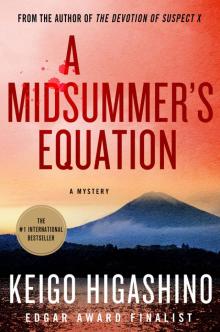 A Midsummer's Equation: A Detective Galileo Mystery
A Midsummer's Equation: A Detective Galileo Mystery The Devotion of Suspect X
The Devotion of Suspect X Journey Under the Midnight Sun
Journey Under the Midnight Sun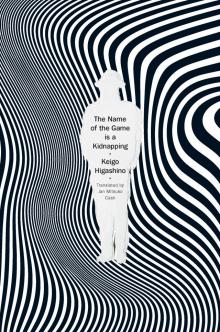 The Name of the Game Is a Kidnapping
The Name of the Game Is a Kidnapping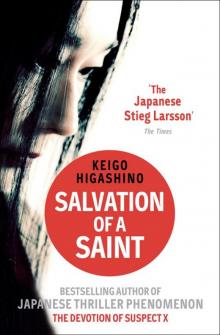 Salvation of a Saint
Salvation of a Saint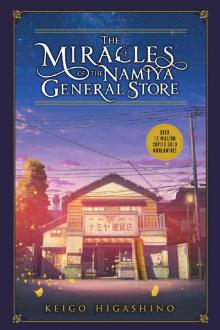 The Miracles of the Namiya General Store
The Miracles of the Namiya General Store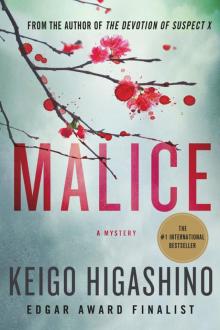 Malice: A Mystery
Malice: A Mystery